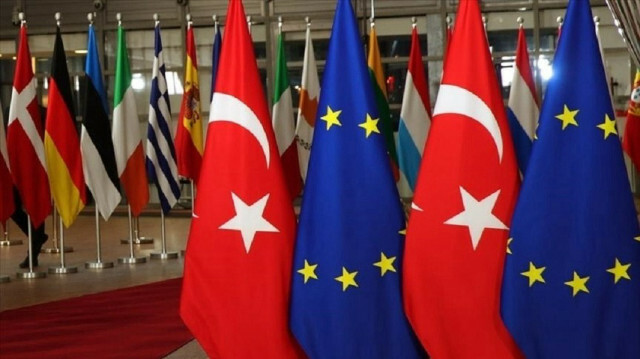
Public opinion appears to favor EU as ‘closest partner in dealing with international matters,’ says German Marshall Fund
The perception of the EU among Turks was revealed Thursday in a survey by a US-based think tank.
“Turkey’s public opinion seems to favor the European Union as the closest partner in dealing with international matters,” said The German Marshall Fund (GMF). “The survey demonstrated people believe the EU's effectiveness for solving global problems compared to other countries or group of countries would lead to better results for humanity. However, this opinion is more pronounced in the 18–24 age group compared to the general population.”
Russia’s war on Ukraine also changed the perception of the Turkish public about Russia, it said.
“Turkish citizens have been less likely to perceive Russia as a partner and more likely to see it as a security threat,” after the start of the war, it said.
When asked about Turkey's two most important partner countries, 47.2% of respondents said Azerbaijan. The number for Azerbaijan was 46.1% in 2021.
Germany was second with 15.4% as opposed to 13.5% in 2021. Russia was third with 13.8%, compared to 18.6% in 2021.
“When asked about the biggest threat as a country or group of countries against Turkey's national interests, 58.3% of the respondents as opposed to 60.6% in 2021 mentioned the United States, followed by Russia with 31% as opposed to 19% in 2021, and Israel with 29.4% as opposed to 24% in 2021,” it said.
About 63.5% of respondents said the most important role Turkey could play in the world is being an economically developed country, as opposed to 65.9% in 2021. A total of 37% said being politically strong – that number was 38.8% last year. And 37.8% said being influential on military matters, compared to 30.6% in 2021.
When asked about which country or group of countries Turkey should cooperate most closely with on international issues, 33.1% preferred EU countries, 5.6% said Russia, 6.8% noted China and 4.7% listed the US.
“24.6% of the respondents as opposed to 15.9% in 2021 wanted Turkey to act alone.”
“It was observed that acting together with the EU countries on international problems was explicitly preferred more by the respondents in the 18–24 age group. 44.4% of respondents in this age group wanted to cooperate more closely with the EU countries as opposed to 33.1% in the general population,” according to GMF.
Nearly half of respondents said they trust the EU, 48.3% expressed trust in the European Court of Human Rights (ECHR) and 39.4% said they trusted NATO.
Support for Turkey’s membership in the EU is higher in the 18-24 age group than in the general population, but the public’s confidence in possible EU membership remains low, according to the data, said GMF.
“Support for the political reforms that Turkey needs to make for visa liberalization is high and is steadily increasing,” said GMF.
“Although there is a clear tendency towards thinking Turkey and the EU have conflicting foreign policy interests, plurality of the respondents believe Turkey and the EU have common interests in Ukraine,” it added.
The survey was conducted between March 2 and 26, 2022 in 27 different Turkish provinces with face-to-face interviews held with 2,180 people.
Hello, the comments you share on our site are a valuable resource for other users. Please respect other users and different opinions. Do not use rude, offensive, derogatory, or discriminatory language.
The floor is all yours.








